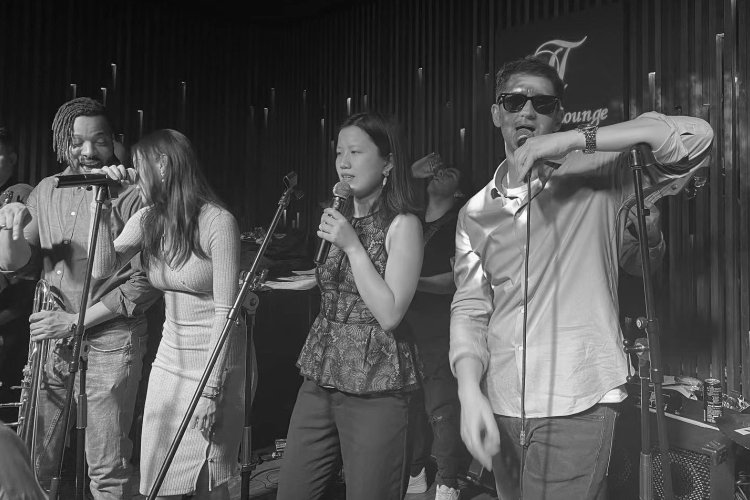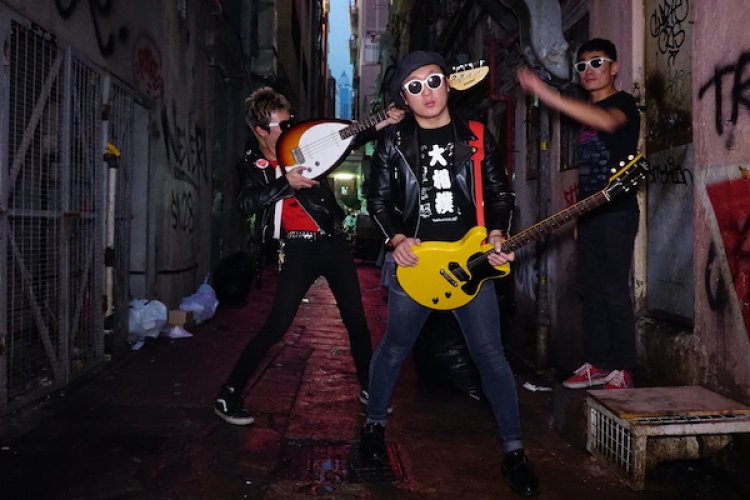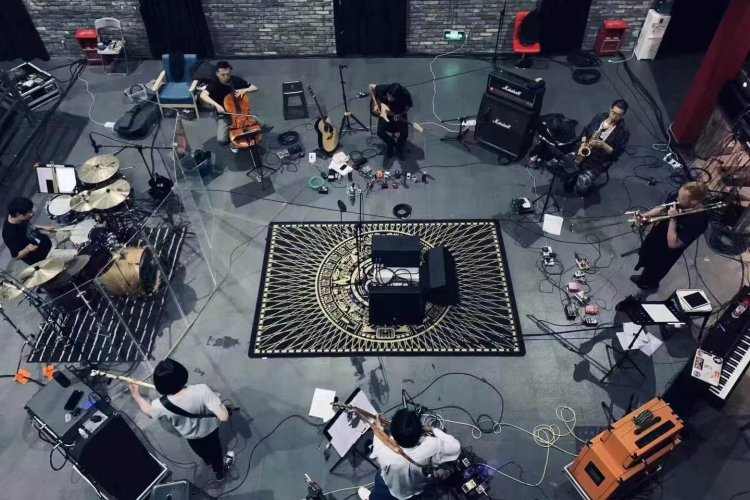Shanghai Qiutian Talk Collaboration and the Hurdles of Integrating Into the Chinese Music Scene
Making it in the Chinese music scene is hard enough as it is, but for expats it can become a hustle that’ll have you running in circles or worse yet, in place, as you tirelessly try to gain traction. The system can appear stacked against outsiders for the most part, which is why many expat bands enclose themselves in bubbles, performing with the same group of bands to the same group of friends time after time. Nevertheless, every once in a while a band is any to slip through the cracks and make an impression on the larger scene.
Therefore, when I discovered a release on Wuhan-based Wild Records (the label that put juggernauts like Chinese Football on the map) from an unknown band by the name of Shanghai Qiutian, I was shocked to discover the band was founded by two foreigners.
Finding the atmospheric and textual beauty within their confines of math and post-rock, Shanghai Qiutian offer a fresh take on the genre that has flooded the eardrums of Chinese audiences over the past two decades. While shades of emo linger below the surface, there’s also a low-key seductiveness found in the looping chords and intricate interplay found within the production. Then there are the stellar guest spots from vocalist Sara Zozaya and Chinese Football themselves, who pair nicely among the delicately laced drums and vigorous guitar work.
Now a five-piece outfit, rounding up a crew of homebred musicians to fill out their sound, Shanghai Qiutian have been plugging away across China, rapidly building a fanbase. That includes their Beijing debut this Saturday, Jul 27 as they join DDC’s fifth anniversary celebrations alongside Shenzhen’s Thin City, Pizza Face, and Stranding Imbrium.
I chatted with the Basque-raised Eñaut Martí Zinkunegi ahead of their show about avoiding the expat trap, and how a chance encounter in Wuhan led them to find their label.
Could you give readers a little background - how did you end up in Shanghai and what were the events that led to the creation of Shanghai Qiutian?
Eñaut Martí Zinkunegi: Myself and Florian [Rudin] initially came here for two months for our university studies. As part of my studies, I started MusicLAB (my music school) and after two months in Shanghai I called my mom and said: "Maybe I am staying here." And well, it's been almost four years now.
We had both been playing in bands before; Florian in Switzerland and myself in the Basque Country, and had always been pretty active in our respective scenes. So in Shanghai, each of us were desperately trying to find bandmates and we eventually bumped into each other on a Monday night at Yuyintang’s Open Mic. We had a special connection, so we exchanged WeChat contacts, but we did not hear from each other until months later. We started jamming together and formed our first band, FEIYAO, but which did not work out. So we decided to keep writing songs together and formed what is now called Shanghai Qiutian.
How did you guys end up connecting with Wild Records? You’ve nabbed some pretty impressive guest spots on your debut EP - how did those come together?
Florian once brought me to eat Wuhan noodles in a small Zhenping Lu store – that was the first time I heard anything about Wuhan – but I fell in love instantly. Then, the Basque band BERRI TXARRAK played in VOX Wuhan instead of Shanghai (for some strange reason), so we went together to check it out.
We heard that they had a studio, and when we met Ben (a Wuhan-based musician who performs as Milu) we were (coincidentally) listening to Chinese Football and began discussing how they were one of the first Chinese bands that we really liked. We wanted to escape from Shanghai and discover more things, so we asked Ben to introduce us to the studio management, and we eventually booked ourselves in. The guys from Wild Records worked upstairs, and they ended up listening to the recording and they ended up singing on it (totally improvised). And it seems it was a match.
For us it’s natural to collaborate with people – it’s part of the discovery. We want to dig deep into the culture and know more about everything that is going on, so what better way is there than being with the people who are building this culture? For future collaborations we want to explore more, maybe include different genres and instruments, but the most important thing is that there is a willingness to do it from both sides – we must admit that we are finding a lot of passiveness from others, like: "Who the f**k are you, why I should collaborate with you?" but we will keep asking around.
You’ve been building quite the network with indie bands across China – how important was it you guys to delve into the local scene and venture out? Is it easy to fall into the trap of expat groups in Shanghai still?
We were pretty decided that if we wanted to be a Chinese band (in terms of a scene), we should try to collaborate with Chinese bands, play with them, attend Chinese festivals, sing in Chinese, and discover the country through music. For us, again, it was pretty natural not fall into the expat groups, but it was done on purpose – it's not a matter of luck.
What have been some of the lows and highs of your tour thus far?
Well, touring has the up and downs of any relationship I guess. We started without knowing our bandmates, who joined just one month before playing our first concert, so that was interesting. But we totally love going on tour, hitting the road is definitely one of our favorite things so we feel pretty lucky to be able to do this. In some of the concerts because of the baopi [license] etc. we have lost a bit of money, but "hey! it's totally fine."

What’s the story behind the song "New Era, Shared Future" (which sounds like a slogan you might see plastered on a wall around these parts)?
About "New Era," actually, it’s a CIIE (import-export convention) phrase. We work next to the convention center and all the walls and streets are covered with this phrase. After seeing it daily, it started to take on a new kind of meaning for us, and also, because we were there to build something new, it felt like a new era. After the album release, it feels like it is actually the beginning of a new era.
I noticed you also run a music school. What exactly does that entail? How has it developed over the years?
I started my music school (MusicLAB) around three and half years ago. It was part of my final degree dissertation and I came here just for two months, but suddenly it worked “better” than expected. We created our own method to guide people in music creation, using music as a tool of enlightenment; trying to make them more confident and in the end happier. We started in Shanghai, but now we work in Hangzhou too, so that’s why I need to travel quite a bit every week. But it’s great because I have the chance to get to know a different city and a different scene.
What can audiences expect for this weekend?
Beijing is always a scene that you are always looking at. I haven’t been to a concert there since I was in the Temple Bar accidentally during my first year in China. I would love to talk and meet people who are active right now, understand how things work up there, and what the people are feeling and wanting, too.
Beijing is a really important part of the Chinese cultural environment, so it’s one step towards our aim of understanding the country a bit more. We are really excited to meet people, eat local food, and for sure, see local bands perform.
Catch Shanghai Qiutian alongside Thin City, Stranding Imbrium, and Pizza Face at DDC on Saturday, Jul 27. Tickets are RMB 80 or RMB 60 advance.
READ: The Unlikely Story of How American Football Came to Tour With Chinese Football
Photos: Chuang, courtesy of Shanghai Qiutian







